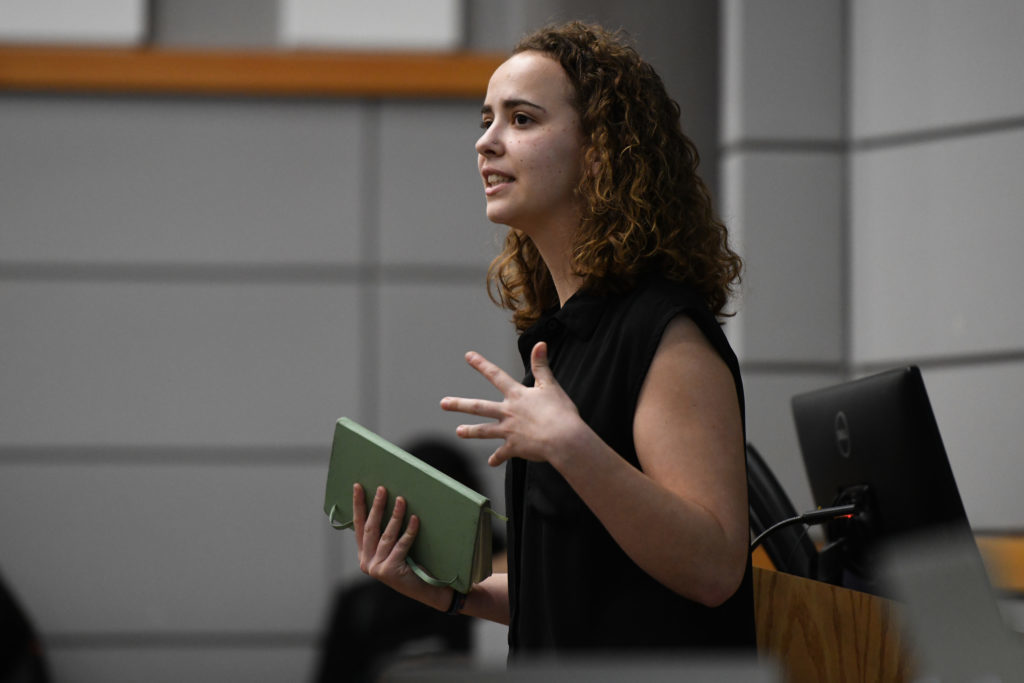The Panhellenic Association will launch a permanent task force this summer to combat sexual assault in Greek life.
Student leaders said the task force, comprised of students in Panhel and the Interfraternity Council, will ensure Greek chapters are enforcing a list of recommendations released last fall requiring chapters to implement sexual assault prevention training in new member modules and station sober monitors at social events.
The group, which will be the first permanent iteration of a Panhel task force implemented last summer, will pen new recommendations on disciplinary actions for chapters that do not comply with the sexual assault prevention guidelines at a date to be determined, Greek student leaders said.
Elizabeth Jessup, the president of Panhel, said the permanent task force will continue to work alongside Panhel and IFC leaders to guarantee that the councils are working with individual chapters to implement the recommendations.
She added that the task force has worked to turn initial recommendations – which were released in September – into policy and legislation within Greek chapters and councils.
“They represent the first set of steps our community can take to preventing sexual assault on campus,” Jessup said in an email. “We know that our community still has a lot of work to do and we are committed to continuing to take action.”
Jessup said the task force was written into Panhel’s bylaws as the “Panhellenic Sexual Assault Task Force Working Group” and will now be a permanent standing committee overseen by the vice president of standards and executive vice president of administration.
“Creating the standing committee in our bylaws ensures that the working group will continue to exist in perpetuity to combat sexual assault and give our chapters and members the resources to effectively prevent and respond to sexual assault,” she said.
Jessup said the task force encountered some logistical challenges this year as it attempted to implement the guidelines because it was difficult to ensure that Greek chapters had definitive consequences if the recommendations were not met.
She said establishing a permanent task force would push for the recommendations to be more institutionalized in the Greek community, where there would be more direct consequences for chapters who do not comply with the recommendations.
“I am confident that they will be able to channel the motivation of our community into tangible, effective action,” she said.
Christina Witkowicki, the director of student involvement and Greek life, said that as advisers, officials work with Greek organizations “on a variety of topic areas they identify as important to the overall GW community.”
“We supported the student-originated Panhellenic Association Sexual Assault Task Force through its formation and process and continue to support the group through its implementation and accountability of recommendations,” Witkowicki said in an email.
Ruchika Sharma, a member of Pi Beta Phi who will serve on the permanent task force, said the group will work to expand survivor and student support resources, focusing specifically on how to keep students safe during the ‘red zone,’ a period of time at the start of the fall semester when incidents of sexual assault spike for college freshmen.
Greek life leaders initially created the task force last spring following an increase in the number of sexual assaults reported on campus.
“Unfortunately, the Title IX resources on this campus are not as strong as they used to be, and Panhel and the Greek community can really do its part to address the issue on their side because it’s not just a Greek life issue, it’s very much a campus issue,” Sharma said. “But we do need to address the issue within our own community as it stands.”
Davis Conger, a member of Sigma Chi who served on the pilot task force last summer, said his chapter sent more than the recommended 80 percent of members to Title IX trainings – a participation rate he hopes other chapters will mirror after the new task force begins its work.
He said its common knowledge that men are often the main perpetrators of sexual violence within the Greek community, which is something fraternities should not ignore.
“It’s more than important for us to be able to accept that, to be able to acknowledge that, and work with that and sort of move forward to accept the issue and try to prevent it,” Conger said.
Sabrina Zuskov, a former member of Alpha Epsilon Phi and member of the task force last summer, said she hopes the permanent task force can work to create a safe environment within the Greek community – which can currently be a “microcosm” where assault is normalized. She said the new task force should work to make more resources and information about reporting available to survivors.
“A lot of times survivors don’t really want to talk to other people about it and don’t even know where to start,” Zuskov said. “I think it’s just a good place to start because everyone needs the help.”
Parth Kotak and Sarah Roach contributed reporting.





